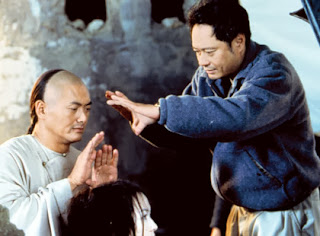It's fitting that the first Oscars of the new millennium would set a precedent for a major category. In 2000, for the first time in the history of the ceremony, a director received multiple Best Director nominations in the same year, as Steven Soderbergh was nominated for both Traffic and Erin Brockovich (he would win for the former). No one's been able to match that feat since, and likely no one ever will, but the other nominees in this year's category are no slouches themselves. Ang Lee and Stephen Daldry were introduced to mainstream audiences, and Ridley Scott made a terrific comeback film that re-energized his career. All in all, it was a pretty terrific year. Here are the nominees:
Ang Lee, Crouching Tiger, Hidden Dragon
To most American moviegoers in the year 2000, Ang Lee was best-known - if at all - for directing the Emma Thompson-starring Sense & Sensibility nearly five years prior. To cinephiles, he was better known for a pair of films from his native Taiwan: The Wedding Banquet (1992) and Eat Drink Man Woman (1993). It's not an exaggeration to say that Crouching Tiger, Hidden Dragon, his martial arts epic that took home an incredible four Academy Awards, changed everything. The film is a visual stunner, and Lee proved he knew how to stage eye-popping action sequences just as well as he could romantic drama and interior plights. The film would introduce Chow Yun-Fat, Michelle Yeoh, and Zhang Ziyi to American audiences, but the real star of the film is Lee's incredible direction (credit where credit is due, too, to stunt coordinator Yuen Wo Ping). Most importantly, it set the stage for his post-millennial career, one that's been richly varied and never short of fascinating. But from the wire-fu fight scenes to the stirring relationship between the two lead warriors (Chow and Yeoh), no one deserved this Oscar more than Lee.
More after the jump.
Ridley Scott, Gladiator
Before Gladiator, Scott was best-known for directing two science-fiction masterpieces, Alien (1979) and Blade Runner (1982), as well as the feminist joyride Thelma & Louise (1991). Go back and watch any of those films, and it should come as no surprise that Scott knows how to craft a wholly entertaining feature that can also be thought-provoking. Gladiator, though, was the film in which that "are you not entertained!?!" side came to the forefront. Thanks to Scott, the film is a sumptuously-realized revenge epic that uses the bread-and-circuses era of the Roman Empire as its backdrop, casting a now-enslaved general (Russell Crowe) as a man the emperor personally wants to break. Of course, he's got something to say about that. If it lacks social commentary or deeper philosophical concerns, it makes up for that by being nothing short of an enthralling romp through an ancient land. Scott proved he could make a blockbuster, and he was rewarded for it with a very deserving nomination.
Steven Soderbergh, Erin Brockovich
Of Soderbergh's double nominations in this category, being recognized for his work on Erin Brockovich is the more surprising one. Sure, it features a much-celebrated performance from Julia Roberts in the titular role, and it's considered one of the better biopics of the decade. And even if the look of the film is typically Soderbergh-ian (the yellow filter he's become so reliant on recently is used here), it's not as flashy as some of his other low-key efforts, like Che or The Good German. That's actually to the film's benefit, though. Soderbergh wisely lets Brockovich herself - well, Roberts-as-Brockovich-herself - do the heavy lifting in the film, while giving the then-already tired biopic genre a facelift but emphasizing a single event that transformed that person. It's subtle, but it's just as deserving of a nomination as his other film from 2000. Speaking of which...
*Steven Soderbergh, Traffic
If Erin Brockovich is Soderbergh operating in a more subtle mode (not completely unlike his no-budget independent films), then Traffic is him showing off everything he can do. For starters, he utilizes a different color filter for each storyline in this everything-is-connected drama, swapping from the cool blues of the mansions of Washington to the blistering yellows of the Mexican desert (Soderbergh often serves as cinematographer on his films, using the alias "Peter Andrews"). Then there's the wide variety of great performances he gets from his sprawling ensemble, particularly from Benicio Del Toro and Don Cheadle as police officers on opposite sides of the U.S.-Mexican border facing the same challenges. Most impressively, though, Soderbergh keeps the whole thing from collapsing under its own weight, handily juggling the various narrative threads without losing sight of any of them. Even when the film gets too heavy-handed in it's thematic message, Soderbergh keeps it from being overwhelming. It's not surprise that he won the Oscar for his work here.
Stephen Daldry, Billy Elliot
Few filmmakers have debuts as wonderfully, thoroughly felt as Daldry has in Billy Elliot. A beautiful coming-of-age tale about a boy (Jamie Bell) in an industrial English town who wants to dance ballet, Daldry gives the film a fine working-class feel, never undermining his underdog lead. Each frame is expertly composed, with the dance sequences visually matching the fluidity of the dancers' movements. Most importantly, though, Daldry elicits terrific performances from his cast, especially Best Supporting Actress nominee Julie Walters as a dance instructor and Bell, who at the time was making his acting debut. It takes a strong director to get that kind of performance out of such a novice, regardless of the latter's talent. The only reason Daldry doesn't rank higher is because the category is so stacked.
1. Ang Lee, Crouching Tiger, Hidden Dragon
2. Ridley Scott, Gladiator
3. Steven Soderbergh, Traffic
4. Steven Soderbergh, Erin Brockovich
5. Stephen Daldry, Billy Elliot





Comments